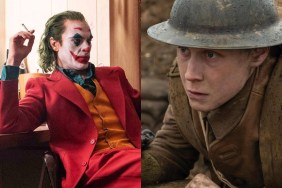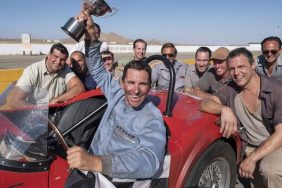The fact that Oscar prognosticators exist, and actually have an ounce of credibility, owes a lot to the fact that the Academy Awards tend to follow a series of patterns. The film with the most nominations usually wins Best Picture. Films about the Holocaust tend to win everything. Et cetera. Et cetera. So although the Oscars usually have at least one or two surprises every year, the frontrunners in each category usually win everything.
Usually. Not so much this year.
This year, a large number of categories went in unexpected directions, eschewing “conventional wisdom” to reward underdogs and dark horses, and preventing one of the biggest movies in history from taking home a single, solitary award.
Let’s take a look at the most surprising moments from the Oscars 2016, the ones that proved the pundits wrong and left the audiences at home scratching their heads… sometimes even in a good way.
Also: Oscars 2016 | All the Winners Are Here
Spotlight Wins Best Picture

Open Road Films
Tom McCarthy’s exceptional drama – about the Boston journalists who cracked open a worldwide conspiracy to protect child molesters within the Catholic Church – was considered an early frontrunner for Best Picture, but eventually became a dark horse after enormous amounts of buzz for The Revenant and The Big Short and even Mad Max: Fury Road.
This may be the most surprising Best Picture win in recent memory, and it’s the first Best Picture winner with only two overall wins since The Greatest Show on Earth in 1952. Spotlight also took home an Oscar for Best Original Screenplay, a richly deserved award for a film that deftly tackles a broad subject and highlights the human tragedy of without seeming maudlin or manipulative.
Mark Rylance Wins Best Supporting Actor

Dreamworks Pictures
Mark Rylance has been a mainstay at practically every awards show this year, but usually just as a nominee, not a winner. As such, pundits believed Best Supporting Actor was probably destined to go to either Sylvester Stallone for Creed (honoring a lifetime of work, and the influence of the Rocky movies), or Mark Ruffalo for Spotlight (it was a great performance, and he’d been snubbed many times), or Tom Hardy for The Revenant (which had a lot of awards momentum, and could also have doubled as a win for Mad Max).
But to their credit, the Oscar instead went to Rylance, whose performance in Bridge of Spies is – if we are completely honest – the very best part of Bridge of Spies. His character’s cool demeanor could have been an implausible tick for a lesser actor, but he somehow makes a relaxed personality seem plausible, even though he’s playing a Russian spy on trial in America at the height of the Cold War. When people ask why he isn’t worried, he always responds, “Would it help?” That’s an enlightened attitude that a lot of us nervous wrecks in the world could learn from, and it sticks with you long after the movie is over.
“Writing’s On the Wall” Wins Best Original Song
There is a strange and inaccurate belief out there that the Academy loves James Bond theme songs. Sorry folks, but they don’t. Only one James Bond song had ever won an Academy Award before this, and it was “Skyfall,” just a few short years ago.
Topping it all off, “Writing’s On the Wall” is far from the most popular of Bond songs. Reactions to the theme were mixed upon its original release, and even those who liked it (I think it’s decent enough) wouldn’t put it in the upper echelon of James Bond song canon.
It seemed like the star power of Lady Gaga, combined with the timely subject matter of “Til It Happens To You” would probably put the song over the top in this category. Sure, the song was for a relatively obscure film, but that hasn’t stopped the Oscars before. (Remember when The Motorcycle Diaries won? Of course you do.) This category doesn’t always go to the most visible or popular song nominated – “Everything is Awesome” from The LEGO Movie lost last year – so this one came as quite a bit of a shock.
Ex Machina Wins Best Visual Effects

A24
One of the most acclaimed films of the year, Ex Machina is a small, independent, relatively low-budget film about a scientist testing the artificial intelligence of his robot. The visual effects are mostly used to emphasize – at turns – the humanity and inhumanity of Alicia Vikander’s character, a robot whose personality and motives are inscrutable and strange. It was competing with visual effects extravaganzas like Star Wars: The Force Awakens and Mad Max: Fury Road and The Martian, and it seemed unlikely to compete in such a high-tech environment.
But kudos to the Academy for recognizing that, even though those other films have impressive visual effects, Ex Machina is a work of genuine art that could not have been possible without the careful application of its technology. The Oscars like to skew classy in this category – Hugo defeated Rise of the Planet of the Apes, Life of Pi beat The Avengers and The Hobbit – but they’ve also given a lot of VFX awards to mainstream blockbusters (and wannabe blockbusters) like Avatar, The Golden Compass and Spider-Man 2.
Ex Machina was a long shot, especially considering it was up against a film that, in theory, should have been a juggernaut…
Star Wars Goes Home Emptyhanded

Walt Disney / LucasFilm
It’s one of the biggest movies in history, beloved by practically everybody who saw it. And even though it was nominated for five Academy Awards, it didn’t win a single one of them. Not even Best Visual Effects, which should – again, theoretically – have been a total lock.
What happened? Maybe Star Wars just doesn’t stick out the way its competitors do. Mad Max: Fury Road was in your face with its sound effects, while Star Wars rehashed a lot of familiar noises that voters take for granted: light saber hums, X-Wing flybys, blaster fire. Ex Machina had a more memorable CGI character (sorry Maz Kanata), and John Williams didn’t compose a new theme that was as hummable as his creations from the original trilogy, giving Ennio Morricone the room he needed to finally win a competitive Oscar.
But you know, in a recent article I pointed out a quote from George R.R. Martin that applies here: “The reward for popularity is popularity.” Star Wars: The Force Awakens doesn’t need an Oscar to make its mark, but a lot more people are going to see Ex Machina now, and that’s what’s really important here.
Top Photo: A24
William Bibbiani (everyone calls him ‘Bibbs’) is Crave’s film content editor and critic. You can hear him every week on The B-Movies Podcast and watch him on the weekly YouTube series Most Craved and What the Flick. Follow his rantings on Twitter at @WilliamBibbiani.
8 Actors Who Won the Wrong Oscar
8 Actors Who Won The Wrong Oscar
-
Leonardo DiCaprio

Won: Best Actor, The Revenant
Should Have Won: Best Actor, The Wolf of Wall Street
Leonardo DiCaprio's icy endurance test will forever be remembered as the film that won him an Oscar, not as his best work. For that, turn to Martin Scorsese's ebullient and damning recollection of 1980s excess, with a performance by DiCaprio that is equal parts horrifying and hilarious.
Photo: 20th Century Fox
-
Meryl Streep

Won: Best Actress, The Iron Lady
Should Have Won: Best Supporting Actress, Adaptation
To be fair, Streep had already won two Academy Awards, but her win for The Iron Lady was her first Oscar in 29 years, and she had been nominated 13 times in the interim. Sadly, her turn as Prime Minister Margaret Thatcher is one of her worst films from those three decades. Adaptation, on the other hand, gave her one of the most remarkable roles of her career, and is still celebrated almost 15 years later while The Iron Lady, less than five years later, has been all but completely forgotten.
Photo: The Weinstein Company
-
Colin Firth

Won: Best Actor, The King's Speech
Should Have Won: Best Actor, A Single Man
Colin Firth gave a perfectly respectable performance as the stammering King George VI, but it's such an unremarkable film that his win can't help but play like an apology. The year prior, Firth gave one of the best performances of the decade in the insightful character study A Single Man.
Photo: The Weinstein Company
-
Kate Winslet

Won: Best Actress, The Reader
Should Have Won: Best Actress, Eternal Sunshine of the Spotless Mind and Best Supporting Actress, Sense and Sensibility
After nearly 15 years of Oscar-worthy performances, the Academy finally gave Kate Winslet a trophy... for one of her worst films. Her iconic turns in Ang Lee's Sense and Sensibility and Michel Gondry's Eternal Sunshine should have already made her an Oscar-winner twice over.
Photo: The Weinstein Company
-
Morgan Freeman

Won: Best Supporting Actor, Million Dollar Baby
Should Have Won: Best Actor, The Shawshank Redemption
One of the most respected actors of his generation, Freeman only received an Academy Award for an unremarkable supporting turn in Clint Eastwood's once-popular, now mostly disregarded boxing drama. And yet his Oscar-nominated turn in The Shawshank Redemption, a modern classic, remains one of his greatest performances.
Photo: Warner Bros. Pictures
-
Russell Crowe

Won: Best Actor, Gladiator
Should Have Won: Best Actor, The Insider
Russell Crowe was in the middle of an epic streak at the turn of the century, starring in one great film after another. And yet while Gladiator may be a solid flick, it's a generic action hero performance from Crowe, who did more nuanced and impressive work in Michael Mann's cigarette company exposé The Insider just one year earlier.
Photo: Dreamworks Pictures
-
Judi Dench

Won: Best Supporting Actress, Shakespeare in Love
Should Have Won: Best Actress, Mrs. Brown
Dame Judi Dench's win for Shakespeare in Love is considered one of the funniest jokes in Oscar history. She's barely in the movie and has very little to do or say when she does appear on camera. It seems to be yet another apology: her incredible performance as Queen Victoria in Mrs. Brown was nominated, but not rewarded the year before.
Photo: Miramax Films
-
Al Pacino

Won: Best Actor, Scent of a Woman
Should Have Won: Best Actor, Serpico and Best Actor, The Godfather Part II
Al Pacino, one of the most celebrated actors in history, only has one Oscar, and it's for... well, not his WORST movie, but easily his most mockable. His mannered performance in Scent of a Woman comes complete with a quirky catchphrase ("HOO-ha!"), and pales in comparison to many of his great performances, particularly from the early 1970s, when he did some of the best acting of his career or anybody else's.
Photo: Universal Pictures









